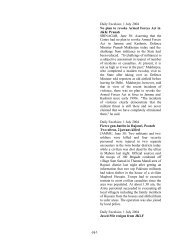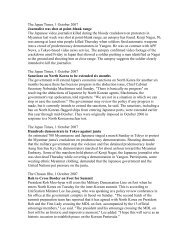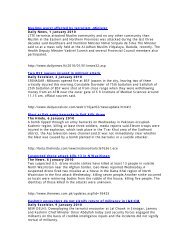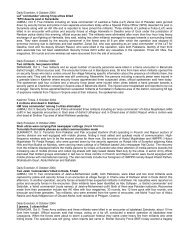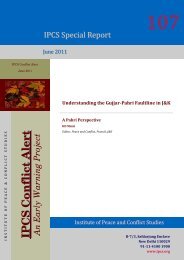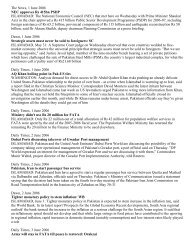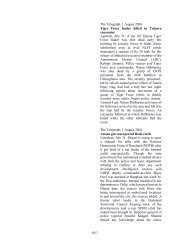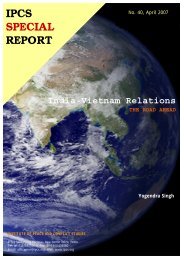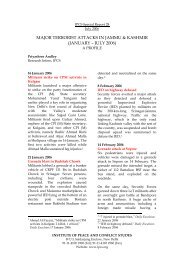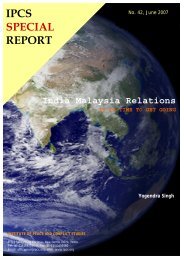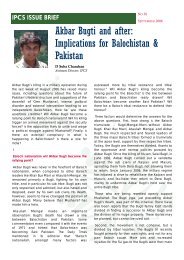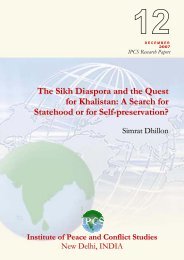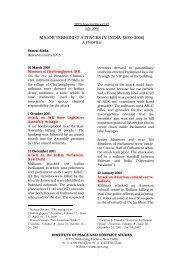April-June 2013 - Institute of Peace and Conflict Studies
April-June 2013 - Institute of Peace and Conflict Studies
April-June 2013 - Institute of Peace and Conflict Studies
Create successful ePaper yourself
Turn your PDF publications into a flip-book with our unique Google optimized e-Paper software.
Commentary<br />
Kargil: Echoes <strong>of</strong> Attacks against Minorities in Pakistan<br />
Zainab Akhter<br />
Research Officer, IReS, IPCS<br />
In Kargil, thous<strong>and</strong>s <strong>of</strong> people took to the streets in February<br />
<strong>and</strong> participated in a protest rally against the killings <strong>of</strong><br />
minorities across Pakistan (this time more specifically against<br />
the recent Hazara killings in Quetta). What are the reasons<br />
behind the sudden outburst <strong>of</strong> protests?<br />
Why the Sudden Outbursts?<br />
For a long time, there has been an anti-Shia campaign in<br />
Pakistan; in Afghanistan, the Taliban regime was strongly anti-<br />
Iranian <strong>and</strong> conducted programmes against the Iranian<br />
Hazara population in the country.<br />
Kargil is the only Shia dominated district <strong>of</strong> Ladakh in Jammu<br />
<strong>and</strong> Kashmir (J&K). Despite minor communal clashes between<br />
the Muslims <strong>and</strong> Buddhists in the region, Kargil remained<br />
peaceful in terms <strong>of</strong> social relations between the<br />
communities. Kargil was better known to the rest <strong>of</strong> India due<br />
to the Indo-Pak war, rather than any negative communal<br />
relationship or violence in the region.<br />
Recently, there has been a series <strong>of</strong> violent activities against<br />
the Shia community in Balochistan <strong>and</strong> also in Gilgit-Baltistan.<br />
The response in Kargil to the violence against the Shia<br />
community in Pakistan was a surprise. Responding to the call<br />
<strong>of</strong> the Imam Khomeini Memorial Trust Kargil, the people <strong>of</strong><br />
the district held a massive protest against the recent Hazara<br />
killings in Pakistan. They gathered outside Jamia Masjid,<br />
shouting slogans against the targeting <strong>of</strong> a particular<br />
community in Pakistan. Earlier in 2012, they took to the<br />
streets in response to the killings <strong>of</strong> Shia-Baltis in Gilgit-<br />
Baltistan. The Kargil Students Union in Jammu <strong>and</strong> Delhi also<br />
organised similar protest rallies chanting anti-Pakistan<br />
slogans.<br />
Being a Shia dominated community, the sectarian killings<br />
elsewhere becomes more <strong>of</strong> an emotional issue for the<br />
people <strong>of</strong> Kargil. Additionally, Iran would not like Pakistan<br />
wielding a sectarian agenda to harass Kargilis; therefore the<br />
people <strong>of</strong> Kargil, through these huge protests, intend to send a<br />
message to Iran that they strongly condemn the killings <strong>of</strong><br />
their brothers across Pakistan. Amidst anti-Pakistan slogans<br />
<strong>and</strong> placards, the protesters requested the Government <strong>of</strong><br />
India to pressurise Pakistan to stop such target killings, <strong>and</strong> for<br />
banning these terrorist groups.<br />
The Iran Factor<br />
Iran's influence is prevalent in Kargil. Posters <strong>of</strong> Iranian leaders<br />
can be seen in most <strong>of</strong> the places, especially in the main<br />
market; <strong>and</strong> even a street in the market is named as Khomeini<br />
Chowk, after the Iranian leader. The region is forging strong<br />
bonds with Iran; besides the Shia factor, what have given an<br />
impetus to this trend are the regular visits <strong>of</strong> youth to Iran to<br />
get religious training. Unlike any other part <strong>of</strong> the State,<br />
developments in Shia dominated areas such as Iran <strong>and</strong> Iraq<br />
are keenly talked about here. Even a political novice could give<br />
a detailed analysis <strong>of</strong> the events in Iran-Iraq, <strong>and</strong> also the<br />
latest statements <strong>of</strong> Shia clerics.<br />
Locals point out that the 'cassette revolution', which refers to<br />
the lectures <strong>and</strong> speeches <strong>of</strong> the Imam, changed the lives <strong>and</strong><br />
religious st<strong>and</strong>ard <strong>of</strong> Kargil after the revolution <strong>of</strong> 1979. Unlike<br />
most other parts <strong>of</strong> India, in Kargil, women, almost without<br />
exception, wear head coverings; liquor is only available<br />
illegally; <strong>and</strong> there are no movie theatres.<br />
Religion in Politics<br />
There are two schools <strong>of</strong> thought in the region, both <strong>of</strong> which<br />
are led by religious organisations: the Imam Khomeini<br />
Memorial Trust (IKMT) <strong>and</strong> the Islamia School Kargil (ISK). The<br />
ISK is backed by the National Conference <strong>and</strong> the IKMT by the<br />
Congress, <strong>and</strong> a strong rivalry is seen between them for<br />
political gains. The differences between the two schools <strong>of</strong><br />
religious thought have magnified with their entering the<br />
realm <strong>of</strong> politics, which is indirectly dividing the society. The<br />
IKMT believes in the Islamic revolution initiated by Imam<br />
Khomeini <strong>and</strong> deems itself as the outcome <strong>of</strong> this revolution.<br />
It works towards the dissemination <strong>of</strong> Islamic teachings <strong>and</strong><br />
elimination <strong>of</strong> un-Islamic traditions. It also runs a school called<br />
Mutahhari Public School where, along with the regular<br />
teachings, it imparts religious knowledge <strong>and</strong> its ideology to<br />
the future generation. On the other h<strong>and</strong>, the ISK also runs a<br />
school, Islamia School, where religious education is imparted<br />
too, but is considered slightly liberal compared to the IKMT.<br />
The religious <strong>and</strong> political divide between these two schools is<br />
taking a toll on the people <strong>of</strong> Kargil, <strong>and</strong> is leading to marked<br />
divisions in the society. The fact that one faction adheres to<br />
the IKMT, <strong>and</strong> the other to the ISK, is quite visible in the town<br />
now. In the whole process, the role, significance, <strong>and</strong> work <strong>of</strong><br />
the Hill Development Council are overshadowed by the<br />
activities <strong>and</strong> influence <strong>of</strong> these groups. Even the divide<br />
between Leh <strong>and</strong> Kargil mostly arises due to religious<br />
differences. Although there are Muslims residing in minority<br />
in Leh <strong>and</strong> Zanskar Valley, such protests are not seen in these<br />
places. There is a negative impact <strong>of</strong> these demonstrations on<br />
the minorities <strong>of</strong> the region, as these massive protests are<br />
sometimes also used as a tool to show religious superiority.<br />
South Asia Plus 27



